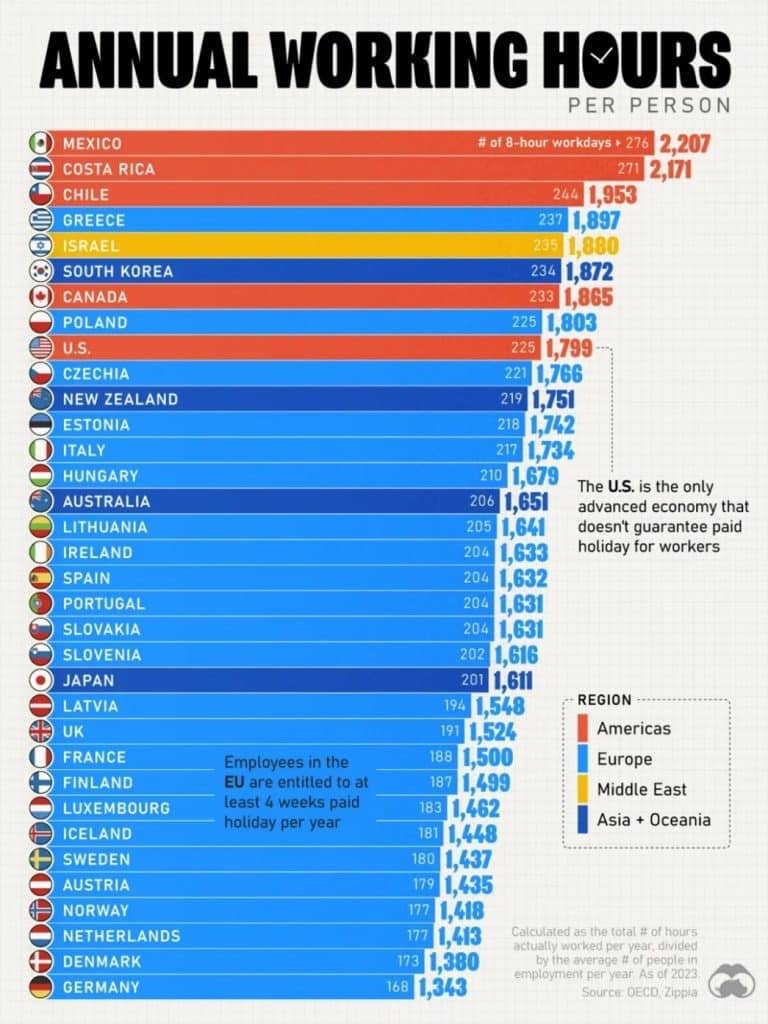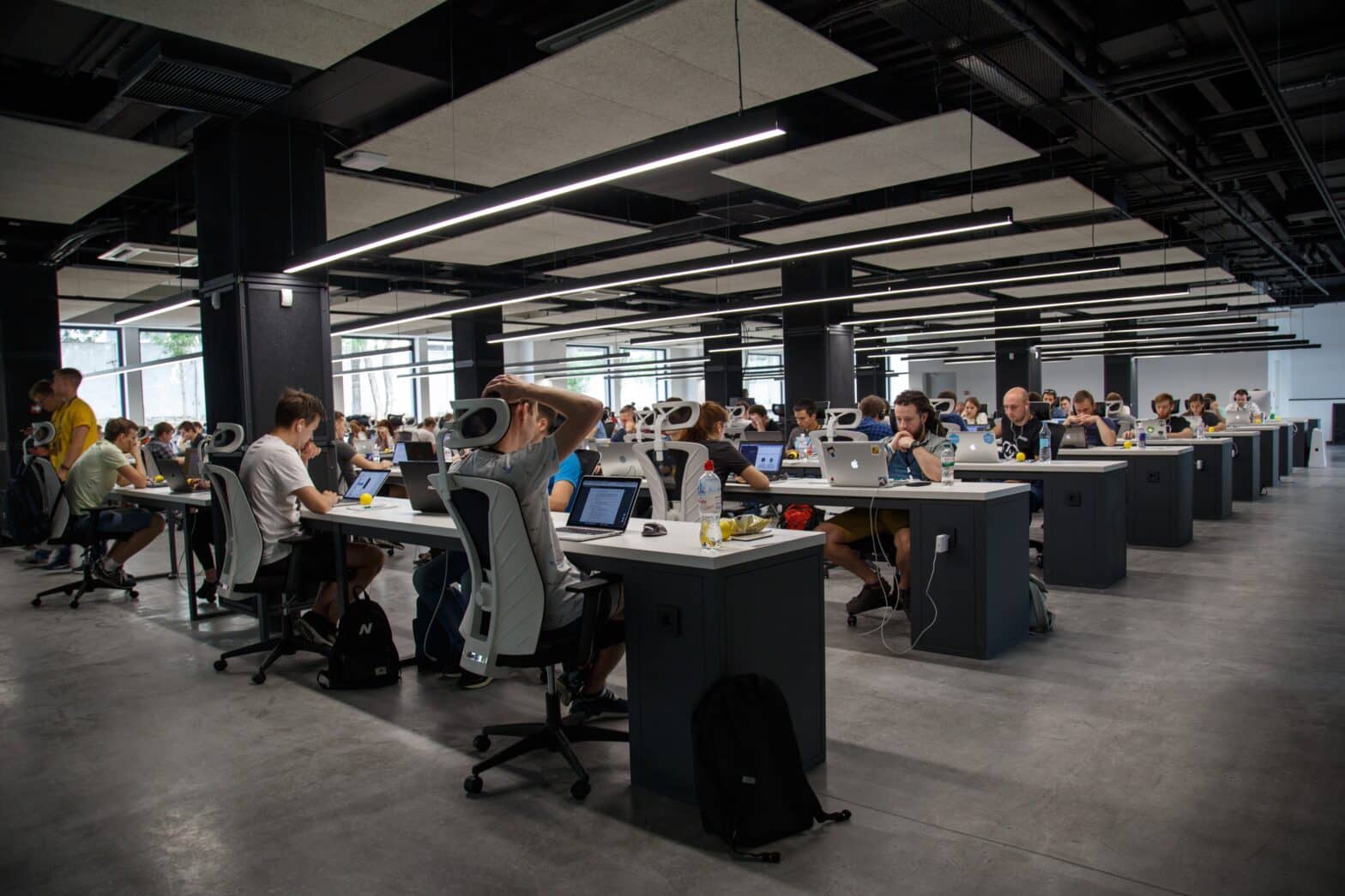Work shapes our daily lives, financial security, and well-being. However, annual working hours vary widely across countries. Some nations have long hours due to economic needs, cultural values, or labor policies, while others prioritize work-life balance with shorter hours and generous leave. Understanding these differences helps assess how work impacts productivity, health, and happiness. Recent OECD data highlights global disparities in working hours, offering insights into work habits and efficiency.
Countries with the Highest Average Working Hours
According to the latest OECD data from 2023, some countries require employees to work significantly longer hours than others. The five countries with the highest average annual working hours are:
- Mexico: 2,207 hours
- Costa Rica: 2,171 hours
- Chile: 1,953 hours
- Greece: 1,897 hours
- Israel: 1,880 hours
In these nations, employees often face long workweeks with limited paid vacation time. For example, in Mexico, the standard legal workweek is 48 hours, with only six days of paid vacation granted after one year of employment. Many workers, particularly those in low-income jobs, take on multiple shifts or extra hours to meet their financial needs.

Similarly, in Costa Rica, the workweek can reach up to 48 hours, and the country has one of the lowest minimum vacation entitlements among OECD members, leading to concerns over worker well-being. Chile, Greece, and Israel also report long working hours, with many employees working overtime, either due to labor demands or economic constraints.
A key concern in these countries is the effect of long working hours on health and productivity. Studies suggest that excessive working hours can lead to burnout, reduced efficiency, and mental and physical health issues such as stress, anxiety, and cardiovascular diseases. In contrast, countries that emphasize shorter working hours often report higher productivity levels and better work-life balance, proving that more time at work does not necessarily equate to better results.
Countries with the Lowest Average Working Hours
At the other end of the spectrum, several countries prioritize work-life balance, ensuring that employees work fewer hours while still maintaining strong economic performance. The nations with the shortest annual working hours in 2023 were:
- Germany: 1,349 hours
- Denmark: 1,346 hours
- Norway: 1,368 hours
- Netherlands: 1,399 hours
In Germany, employees enjoy some of the shortest working hours in the world, thanks to strong labor protections, collective bargaining agreements, and a focus on efficiency rather than hours worked. The typical German employee works around 35-40 hours per week and receives at least 24 days of paid vacation per year. Despite working fewer hours, Germany remains one of the world’s most productive economies, showing that shorter workweeks can still lead to economic prosperity.
Denmark, Norway, and the Netherlands follow a similar trend. In these countries, employees benefit from flexible work arrangements, strong social protections, and progressive labor laws. For example, the Netherlands has one of the highest percentages of part-time workers in the world, allowing many employees to balance their professional and personal lives effectively. Additionally, these countries have generous parental leave policies, which help employees manage their responsibilities without sacrificing career growth. The results speak for themselves—these nations consistently rank high in happiness, health, and quality of life indicators.

The Relationship Between Working Hours and Productivity
One of the most important findings from global labor data is that working longer hours does not necessarily lead to higher productivity. In fact, many countries with shorter average working hours have some of the strongest economies and most efficient workforces. Germany, for instance, produces more GDP per hour worked than many countries with longer work hours, proving that focusing on productivity rather than time spent at work can yield better economic results.

Conversely, countries with extremely long working hours often experience diminishing returns on productivity. Studies suggest that after a certain point, fatigue, stress, and declining focus reduce the effectiveness of additional work hours. Employees who work excessive hours tend to make more mistakes, take longer to complete tasks, and experience higher rates of absenteeism due to illness.
This is why many European countries have moved towards shorter workweeks, often implementing a 35-hour or 4-day workweek model to maximize efficiency while ensuring employee well-being.
Moreover, industries that rely on knowledge-based work, such as technology, finance, and research, benefit the most from shorter working hours, as employees in these fields require creativity, problem-solving skills, and high concentration levels. By reducing overwork and encouraging time for rest and recovery, companies in these sectors can actually increase innovation and long-term success.
Ranking of Countries by Average Annual Working Hours
Based on OECD data for 2023, here is a ranking of selected countries by their average annual working hours:
- Mexico – 2,207 hours
- Costa Rica – 2,171 hours
- Chile – 1,953 hours
- Greece – 1,897 hours
- Israel – 1,880 hours
- South Korea – 1,872 hours
- Canada – 1,865 hours
- Poland – 1,803 hours
- United States – 1,799 hours
- Czechia – 1,766 hours
While Mexico, Costa Rica, and Chile lead in working hours, countries like Germany, Denmark, and the Netherlands rank the lowest, demonstrating the stark contrast between labor markets worldwide.

Finding a Healthy Work-Life Balance
While hard work and dedication are valuable, maintaining a balance between work and personal life is crucial for long-term health and success. Here are some key ways employees and companies can work toward achieving better work-life balance:
- Encourage Flexible Working Arrangements: Employers can introduce remote work, hybrid schedules, and flexible hours to help employees manage their responsibilities effectively.
- Promote Regular Breaks and Rest: Research shows that taking short breaks throughout the day improves focus and prevents burnout. Ensuring that employees take their full vacation allowance is also essential.
- Invest in Employee Well-Being: Companies should provide wellness programs, mental health resources, and stress management training to support a healthy work environment.
- Encourage Efficient Work Practices: Employers can shift their focus from hours worked to results achieved, promoting productivity without requiring excessive overtime.
- Prioritize Personal Time: Employees should ensure they dedicate time to hobbies, exercise, and spending quality time with family and friends, reducing stress and increasing overall happiness.
Conclusion
The data on working hours around the world provides valuable insights into how different countries approach labor, productivity, and well-being. While some nations still prioritize long hours, the evidence suggests that working smarter—not longer—is the key to success. Countries with shorter working hours often experience greater efficiency, better health outcomes, and higher levels of happiness. As more businesses and policymakers recognize the benefits of a balanced approach, the future of work may shift towards models that prioritize both productivity and personal well-being.


